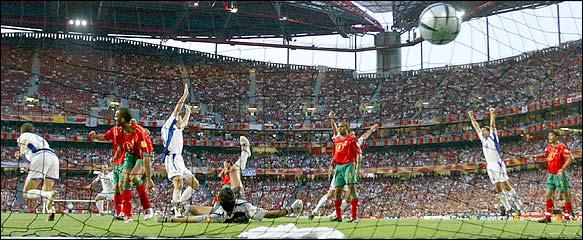[Previous entry: "Wie werde ich Schnell-Grieche? Die Bildzeitung erklärt es uns:"] [Next entry: "Zum Tode von Bernd Pfarr"]
07/05/2004: "Die altehrwürdige New York Times zum EM 2004 Finale Griechenland - Portugal"

LISBON, July 4 - "Ancient Greece had 12 gods, modern Greece has 11," declares the slogan on the side of the bus the Greek soccer team has been using in the European Championships. On Sunday, 14 players largely unknown outside Greece completed their unlikely ascent by beating Portugal, 1-0, in the final of the European Championships.
Before it defeated Portugal, 2-1, in the opening match of the competition on June 12, Greece had played only two major competitions and had not won a match. Six games and four narrow victories later, it is the European champion.
Whatever happens in the Olympics in Athens in August, this is already, as one fan's T-shirt proclaimed, a Greek Summer.
"It's amazing that soccer has managed to unite all Greeks all over the world, something politics has been unable to do," Greece's coach, Otto Rehhagel, said after the game.
An evening that started with clouds of balloons in the Portuguese colors of red and green ended in clouds of confetti in blue and silver as the Greeks collected their trophy.
Seemingly every multiday modern sports event has a closing ceremony, but because few fans stick around after a soccer game, the European Championships organizers decided to have their closing ceremony before the final kicked off Sunday night. The show included loud music, costumed dancers, musicians in traditional dress, national flags, a giant model boat and balloons that floated out of the Stadium of Light.
The match began in a caldron of noise. The blue and white phalanx of Greeks sang on the rare occasions their team had the ball and whistled when Portugal was in possession. The red army of Portuguese, who occupied almost three-quarters of the 65,000-seat stadium, provided an aural mirror image. A steady beating of drums underpinned the cacophony.
Facing a Greek team that plays three defensive midfielders, Portugal's coach, Luiz Felipe Scolari, adjusted his formation.
Cristiano Ronaldo, who had been playing wide on the left, often joined Pauleta in the center of attack. Luís Figo switched from the right to the left. Miguel, a right back who had been told by Scolari to focus on defense after the opening match, had clearly been let off the leash.
Miguel had Portugal's first shot, a low drive that Antonios Nikopolidis tipped around the post. But Miguel retired before halftime after colliding with Pauleta.
The teams' game last month was a Portuguese siege broken by little more than the two sallies on which the Greeks scored. Since that 2-1 victory, the Greeks had grown in confidence.
Once Portugal's early surge had ebbed Sunday, Greece began to impose its pattern on the game. Greece throttled Portugal's attacks in midfield but rarely pushed enough of its own men forward to develop a sustained attack of its own.
By the end of a half in which there had been just two shots on target - both by Portugal - the Greek fans were doing all the singing. The Portuguese were reduced to whistling.
The first, and only Greek strike on target took 56 minutes to arrive. Angelos Basinas took the first and only Greek corner kick of the match. Angelos Charisteas jumped above Costinha and headed it in.
Charisteas had scored Greece's goal on a header in a 1-0 victory over France, the defending European champion, in the quarterfinals. Traianos Dellas scored the only goal in Greece's semifinal victory over the Czech Republic with a header off a corner kick.
Scolari responded to Greece's goal by putting his team on the attack, removing Costinha, a defensive midfielder, and bringing on Rui Costa, who had lost his starting spot after the first loss to Greece. Scolari then played his final card, using his third and last substitution to bring on Nuno Gomes for Pauleta as the central striker.
Five of Portugal's first six goals in the tournament came from Scolari's substitutes, and Nuno Gomes had scored once as a replacement and Rui Costa twice. But this time, Scolari's magic touch deserted him.
Portugal's next two chances fell to Ronaldo in the penalty area. The first time he shot high, the second time straight into a defender.
The closest Portugal came to a goal was a low shot by Figo in the 89th minute. As it rolled just past the post and toward the wall of Portuguese fans, the host nation's last hopes rolled with it.
"They scored and we didn't," Scolari said.